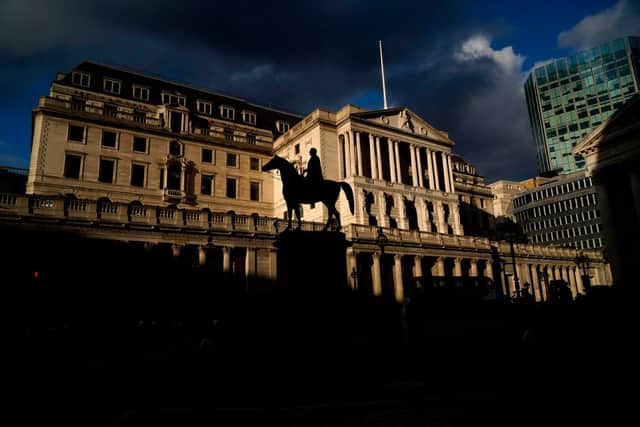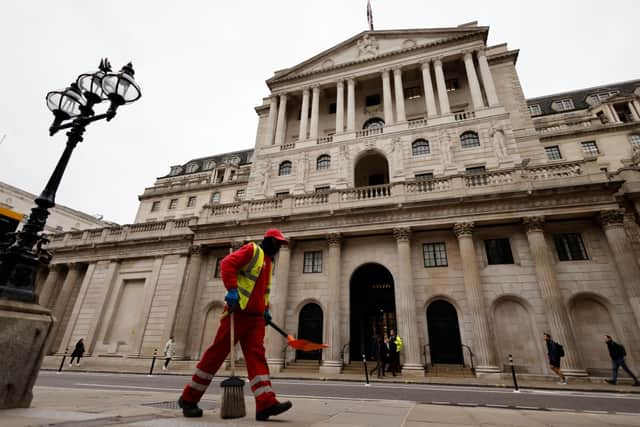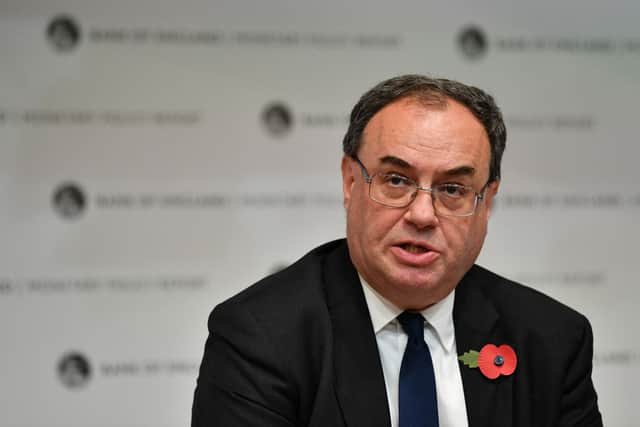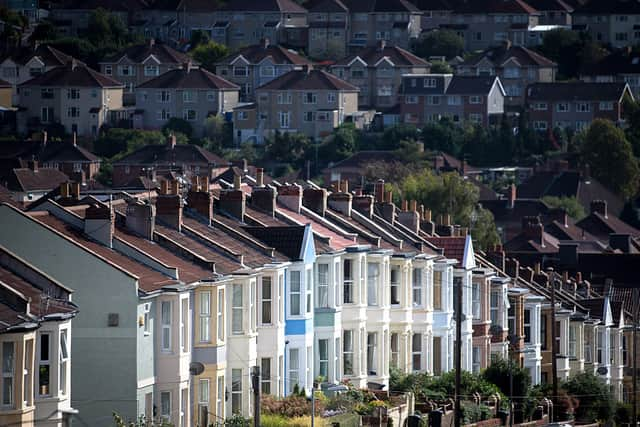Bank of England base rate: what is new interest rate, how much has it risen and what is base rate history?
and live on Freeview channel 276
The UK is seeing its worst cost of living crisis since the early 1990s thanks to soaring inflation.
Household bills and costs have risen across the board, while wages have been struggling to keep up.
Advertisement
Hide AdAdvertisement
Hide AdAs the UK’s central bank, it’s the Bank of England’s job to keep the country economically stable - a goal it attempts to achieve through setting interest rates.
So how has it changed interest rates today (5 May) - and what does it mean for your finances?
Here’s what you need to know.


What is the Bank of England base rate?
As well as ensuring the stability and viability of the UK’s financial system, the Bank of England sets interest rates - i.e. what it costs to borrow money.
Given it lends money to the high street banks, its interest rate - also known as the ‘bank rate’ or ‘base rate’ - has a direct influence on how much members of the public and businesses pay on top of a loan.
Advertisement
Hide AdAdvertisement
Hide AdThis rate is used by the Bank of England to control how hot or cold the economy runs.


If it’s cheaper and therefore easier to borrow, more spending will take place - a situation which can cause inflation to go up.
But if the economy runs too hot and inflation sits too far above the Bank of England’s 2% target rate, making borrowing more expensive by increasing interest rates is likely to slow things down.
In short, high interest rates lead to low inflation and vice versa.


Advertisement
Hide AdAdvertisement
Hide AdThe UK interest rate is decided by the organisation’s Monetary Policy Committee (MPC) - a group of nine people, including:
- The governor of the Bank of England (currently Andrew Bailey)
- Three deputy governors for monetary policy, financial stability and markets & banking
- The Bank of England chief economist
- Four external members who are appointed by the Chancellor of the Exchequer.


This group does not have to change interest rates when it meets and votes to decide the best course of action for the UK economy.
It met on Thursday 5 May and has a further five meetings scheduled over the rest of 2022.
How has Bank of England rate changed?
Historically, the Bank of England interest rate has changed regularly and has been much higher (see graphic).
Advertisement
Hide AdAdvertisement
Hide AdBut since the 2008 financial crisis, rates have remained relatively unchanged.
Loading....
In fact, between March 2009 and August 2016 the rate was kept at 0.5% and it has only changed ten times in 13 years.
This recent period has also seen rates sit at historic lows as the Bank of England tried to heat up the economy while successive Conservative governments implemented an austerity agenda for public spending.
The base rate was set at a record low point of 0.1% throughout the Covid pandemic, but has risen four times since December 2021 as a result of the cost of living crisis.
Advertisement
Hide AdAdvertisement
Hide AdWhen the Bank of England was under government control up until 1997, interest rates were used by those in power to achieve policy objectives.
For example, Margaret Thatcher’s administration implemented high interest rates in the late 1980s to try to keep house prices under control.
What will the interest rate increase mean?
In a move expected by many economists, the Bank of England decided to raise its interest rate to 1% from the previous level of 0.75% on 5 May - the highest rate since February 2009.
However, unexpectedly, three members of the MPC voted for an even bigger increase of 0.5% to 1.25% - raising the prospect further base rate hikes could be on their way.
Advertisement
Hide AdAdvertisement
Hide AdGiving its reasoning for the change, the central bank said it expected inflation to peak at 10% in 2022 - a 40-year high - and forecast a 0.25% contraction in the economy in 2023 as households spending power is set to decrease by 1.75% this year.


These would be the consequences of “a succession of very large shocks and disturbances” to the UK economy, including Russia’s invasion of Ukraine.
In the immediate aftermath of the announcement, the price of the pound dropped 0.8% against the US dollar to £1.24 and 0.9% versus the Euro to £1.174.
While it’s uncertain whether further interest rate rises will be on their way this year, the worsening economic outlook has led commentators to believe the base rate could go up to 2% in 2023.
Advertisement
Hide AdAdvertisement
Hide AdResearch organisation Capital Economics believes the rate could go even higher to 2.25% by the end of 2022 and 3% by the end of 2023.
Financial markets, meanwhile, reckon base rates will be 2.5% by mid-2023.
This means the cost of borrowing money will become more expensive.
So, for example, mortgage payers who aren’t on fixed rate deals will have to repay their loans at higher rates (something which could slow down house prices).
Advertisement
Hide AdAdvertisement
Hide AdIt will also make it more unlikely the Chancellor Rishi Sunak will loosen the public pursestrings to introduce more cost of living support.
However, a base rate rise will also be likely to benefit savers.
What has been the reaction to the Bank of England rate rise?
Business groups and charities have reacted to news of the interest rate hike with concern.
The British Chambers of Commerce said the news would cause “considerable alarm” among the British public and the private sector given the “mounting cost pressures” they face.
Advertisement
Hide AdAdvertisement
Hide AdIts head of economics Suren Thiru said: “The Bank of England faces an unenviable trade-off between soaring inflation and a wilting economy.
“However, higher interest rates will do little to address the global headwinds and supply constraints driving this inflationary surge.
“It also raises the risk of recession by damaging confidence and intensifying the financial squeeze on businesses and consumers.”


This latter point was echoed by anti-poverty campaigners the Joseph Rowntree Foundation (JRF), which warned the UK faced “a winter of grinding daily hardship and worry”.
Advertisement
Hide AdAdvertisement
Hide Ad"The prospect of inflation at 10% later this year will cause shock and fear throughout the country for people who are already finding themselves unable to heat up food, limiting showers to save on energy costs, and riding buses to keep warm,” said Dave Innes, JRF’s head of economics.
"The government must ensure that as a minimum, benefit are increased to match the real rise in living costs. The social security system was woefully inadequate even before the cost of essentials began to shoot up, and needs urgent strengthening if we are to protect people from the harm that could be inflicted in the months to come.”
Comment Guidelines
National World encourages reader discussion on our stories. User feedback, insights and back-and-forth exchanges add a rich layer of context to reporting. Please review our Community Guidelines before commenting.
